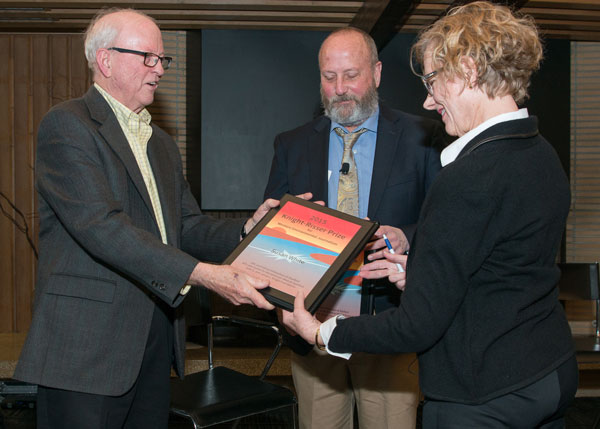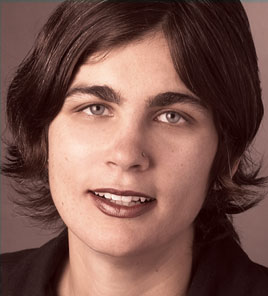
The Bill Lane Center for the American West, Stanford University

2016 Knight-Risser Prize Symposium
Breathless in Texas:
Energy Production Puts Air Quality at Risk
 Read a summary of the 2016 Knight Risser Prize Symposium with photos and complete audio and video here.
Read a summary of the 2016 Knight Risser Prize Symposium with photos and complete audio and video here.
Since 2008, more than 7,000 oil and gas wells have been drilled along the 400 mile long region, with another 5,000 approved by state regulators. But while officals claim that nothing is wrong, residents who live close to oil and gas development report an alarming number of health concerns: nausea, nosebleeds, headaches, body rashes and respiratory problems.
"Big Oil, Bad Air" reveals how there are no clear federal standards to protect people living near drilling sites — including children, the sick and the elderly — who are exposed to varying amounts of toxic emissions for years on end; and how Texas' air monitoring system is so flawed that the state knows almost nothing about the extent of pollution in regions like the Eagle Ford shale.
Nearly a half century after passage of the Clean Air Act, what is being done to protect the air that we breathe? Especially in the wake of the Porter Ranch gas leak in Los Angeles and endemic air quality problems in agricultural areas like California's Central Valley.
A distinguished panel of journalists, educators, and policy experts will tackle this question and others. The event will be followed by a reception with light refreshments.
Panel Discussion, Award Presentation and Q&A Session
Wednesday, Feb. 17, 2016
4:15-6:30pm
Oak Lounge
Tresidder Memorial Union, Second Floor
Stanford University
(View map: Stanford | Google)
Panelists
Sasha Khokha, Moderator
Central Valley Bureau Chief, KQED News,
The California Report
Jim Morris
Managing Editor, the Center for Public Integrity
Winner, 2015 Knight-Risser Prize
for "Big Oil, Bad Air"
Susan White
Executive editor, InquireFirst
Former Executive Editor,
InsideClimate News
Winner, 2015 Knight-Risser Prize
for "Big Oil, Bad Air"
Madeline Stano
Staff Attorney,
Center for Race, Poverty and the Environment
Danny Cullenward
Energy Economist
JD, Stanford University
Location
Oak Lounge, Tresidder Memorial Union
Stanford University
459 Lagunita Drive
Stanford, CA
(View map: Stanford | Google)
Logistics
Parking on campus is free after 4pm.
Panelist Biographies
Sasha Khokha, Moderator
 Sasha Khokha is Central Valley Bureau Chief for KQED Public Radio’s statewide public radio program, The California Report. Based in Fresno, she covers a vast geographic beat, including the nation’s most productive farm belt, some of California’s poorest towns, and Yosemite and Sequoia/Kings Canyon National Parks. Whether trekking up a Sierra glacier with her microphone, interviewing farmworkers in Spanish, or explaining complicated air or water quality issues, Sasha translates rural California to public radio audiences across California, and the nation. Sasha’s work on the impact of farm fertilizers on drinking water contamination was recognized with a special citation from the Knight-Risser panel in 2012. Her reporting has also raised attention to the failure of air regulators to provide effective public health warnings to families living in the Central Valley, one of the nation’s most polluted air basins. One in five kids there has asthma, and air quality monitors in register dangerously high ozone or particulate matter levels more than a hundred days each year. That is, if the monitors are working. Sasha’s work has also helped expose the hidden price immigrant women janitors and farmworkers may pay to keep their jobs: sexual assault at work. Her “Rape in the Fields” radio series helped change California law with regard to sexual harassment training for farm supervisors, and won a national PRNDI award for investigative reporting, as well as prizes from the Radio Television News Directors Association and the Society for Professional Journalists.
Sasha Khokha is Central Valley Bureau Chief for KQED Public Radio’s statewide public radio program, The California Report. Based in Fresno, she covers a vast geographic beat, including the nation’s most productive farm belt, some of California’s poorest towns, and Yosemite and Sequoia/Kings Canyon National Parks. Whether trekking up a Sierra glacier with her microphone, interviewing farmworkers in Spanish, or explaining complicated air or water quality issues, Sasha translates rural California to public radio audiences across California, and the nation. Sasha’s work on the impact of farm fertilizers on drinking water contamination was recognized with a special citation from the Knight-Risser panel in 2012. Her reporting has also raised attention to the failure of air regulators to provide effective public health warnings to families living in the Central Valley, one of the nation’s most polluted air basins. One in five kids there has asthma, and air quality monitors in register dangerously high ozone or particulate matter levels more than a hundred days each year. That is, if the monitors are working. Sasha’s work has also helped expose the hidden price immigrant women janitors and farmworkers may pay to keep their jobs: sexual assault at work. Her “Rape in the Fields” radio series helped change California law with regard to sexual harassment training for farm supervisors, and won a national PRNDI award for investigative reporting, as well as prizes from the Radio Television News Directors Association and the Society for Professional Journalists.
Jim Morris
 Jim Morris is managing editor for environment and labor at the Center for Public Integrity. A journalist since 1978, Morris has won more than 70 awards for his work, including the George Polk award, the Sidney Hillman award, three National Association of Science Writers awards and five Texas Headliners awards. He directed a global investigation of the asbestos industry that won the John B. Oakes award for environmental reporting from Columbia University in 2011 and an IRE Medal from Investigative Reporters and Editors. He also led projects on worker hazards at oil refineries and lingering air toxics problems in U.S. communities that won honors from the National Press Foundation, Harvard University and Hunter College, among other organizations. In April 2013, Morris and two colleagues received the Edgar A. Poe award for national reporting from the White House Correspondents’ Association for “Hard Labor,” a series on health and safety threats to American workers. Morris helped edit “Breathless and Burdened,” a Pulitzer Prize-winning, 2013 investigation of the federal black lung benefits program. Morris also conceived, and was a lead writer on, the 2014 series “Big Oil, Bad Air,” a collaboration with InsideClimate News and The Weather Channel that garnered 10 national awards for its revelations about toxic air emissions from hydraulic fracturing. Morris has worked for a number of newspapers in Texas and California as well as publications such as U.S. News & World Report and Congressional Quarterly in Washington.
Jim Morris is managing editor for environment and labor at the Center for Public Integrity. A journalist since 1978, Morris has won more than 70 awards for his work, including the George Polk award, the Sidney Hillman award, three National Association of Science Writers awards and five Texas Headliners awards. He directed a global investigation of the asbestos industry that won the John B. Oakes award for environmental reporting from Columbia University in 2011 and an IRE Medal from Investigative Reporters and Editors. He also led projects on worker hazards at oil refineries and lingering air toxics problems in U.S. communities that won honors from the National Press Foundation, Harvard University and Hunter College, among other organizations. In April 2013, Morris and two colleagues received the Edgar A. Poe award for national reporting from the White House Correspondents’ Association for “Hard Labor,” a series on health and safety threats to American workers. Morris helped edit “Breathless and Burdened,” a Pulitzer Prize-winning, 2013 investigation of the federal black lung benefits program. Morris also conceived, and was a lead writer on, the 2014 series “Big Oil, Bad Air,” a collaboration with InsideClimate News and The Weather Channel that garnered 10 national awards for its revelations about toxic air emissions from hydraulic fracturing. Morris has worked for a number of newspapers in Texas and California as well as publications such as U.S. News & World Report and Congressional Quarterly in Washington.
Susan White
 In her newspaper career at the Lexington (Ky.) Herald-leader and The San Diego Union-Tribune, Susan White was a television critic, education reporter, writing coach, U.S.-Mexico border editor and enterprise editor. In 2008 she was the first assigning editor hired by the nonprofit investigative newsroom ProPublica, and in 2011 she became executive editor of InsideClimate News. She has edited or co-edited three Pulitzer Prize-winning projects: at the Union-Tribune (2006), ProPublica (2010) and InsideClimate News (2013).
In 2015 Susan began working with a group of prominent journalists to form InquireFirst, an investigative news nonprofit whose goal is to expand the boundaries of traditional journalism. Their goal is to focus on just two or three topics a year and then stick with those topics by offering daily news updates and by inviting people to trade ideas, suggest solutions and hold their political leaders accountable.
Susan is a graduate of the University of Oklahoma school of journalism where she studied professional writing—short stories and novels—under a very wise, pipe-smoking professor, William Foster-Harris, who goaded her into believing she had some talent. In her junior year she succumbed to the lure of traditional newspaper journalism, became editor of the student newspaper and abandoned all thoughts of a fiction-writing career. But the techniques that Foster-Harris taught her continue to shape her work, and that of the reporters she works with, even today.
In her newspaper career at the Lexington (Ky.) Herald-leader and The San Diego Union-Tribune, Susan White was a television critic, education reporter, writing coach, U.S.-Mexico border editor and enterprise editor. In 2008 she was the first assigning editor hired by the nonprofit investigative newsroom ProPublica, and in 2011 she became executive editor of InsideClimate News. She has edited or co-edited three Pulitzer Prize-winning projects: at the Union-Tribune (2006), ProPublica (2010) and InsideClimate News (2013).
In 2015 Susan began working with a group of prominent journalists to form InquireFirst, an investigative news nonprofit whose goal is to expand the boundaries of traditional journalism. Their goal is to focus on just two or three topics a year and then stick with those topics by offering daily news updates and by inviting people to trade ideas, suggest solutions and hold their political leaders accountable.
Susan is a graduate of the University of Oklahoma school of journalism where she studied professional writing—short stories and novels—under a very wise, pipe-smoking professor, William Foster-Harris, who goaded her into believing she had some talent. In her junior year she succumbed to the lure of traditional newspaper journalism, became editor of the student newspaper and abandoned all thoughts of a fiction-writing career. But the techniques that Foster-Harris taught her continue to shape her work, and that of the reporters she works with, even today.
Madeline Stano
 A Metro-Detroit native, Madeline first became passionate about environmental justice while witnessing water shutoffs in the Detroit area. She received her Bachelors in Sociology from the University of Michigan Honors College and her JD from the George Washington University Law School.
Madeline joined CRPE in 2012 as the inaugural Luke Cole Memorial Fellow. Currently she leads CRPE’s Civil Rights campaign and Central Valley anti-fracking work. Her litigation focus areas include Title VI, climate change, and the intersection of environmental and racial justice.
She serves on the Environmental Justice Leadership Forum on Climate Change, Californians Against Fracking Steering Committee and the Bay Area Rapid Transit Title VI and Environmental Justice Advisory Committee. She also writes an environmental justice blog on her work entitled, “Our People, Our Communities, Our Environment.” She is admitted to practice law in California, is published in the Vermont Journal of Environmental Law with a piece on the Native Village of Kivalina entitled Fighting for Home in the Melting and has appeared as a fracking legal expert on Al Jazeera America numerous times.
In her leisure time, Madeline enjoys riding her bike, playing outside, cooking and eating beans of all kinds.
A Metro-Detroit native, Madeline first became passionate about environmental justice while witnessing water shutoffs in the Detroit area. She received her Bachelors in Sociology from the University of Michigan Honors College and her JD from the George Washington University Law School.
Madeline joined CRPE in 2012 as the inaugural Luke Cole Memorial Fellow. Currently she leads CRPE’s Civil Rights campaign and Central Valley anti-fracking work. Her litigation focus areas include Title VI, climate change, and the intersection of environmental and racial justice.
She serves on the Environmental Justice Leadership Forum on Climate Change, Californians Against Fracking Steering Committee and the Bay Area Rapid Transit Title VI and Environmental Justice Advisory Committee. She also writes an environmental justice blog on her work entitled, “Our People, Our Communities, Our Environment.” She is admitted to practice law in California, is published in the Vermont Journal of Environmental Law with a piece on the Native Village of Kivalina entitled Fighting for Home in the Melting and has appeared as a fracking legal expert on Al Jazeera America numerous times.
In her leisure time, Madeline enjoys riding her bike, playing outside, cooking and eating beans of all kinds.
Danny Cullenward
 Danny Cullenward is an energy economist and lawyer working on the design and implementation of scientifically grounded climate policy. From 2013 through 2015, he was the Philomathia Research Fellow at the University of California, Berkeley, where he taught climate law and policy. Danny has also provided pro bono representation to environmental scientists in the Ninth Circuit Court of Appeals and U.S. Supreme Court. He holds a JD and PhD in Environment and Resources (E-IPER) from Stanford University.
Danny Cullenward is an energy economist and lawyer working on the design and implementation of scientifically grounded climate policy. From 2013 through 2015, he was the Philomathia Research Fellow at the University of California, Berkeley, where he taught climate law and policy. Danny has also provided pro bono representation to environmental scientists in the Ninth Circuit Court of Appeals and U.S. Supreme Court. He holds a JD and PhD in Environment and Resources (E-IPER) from Stanford University.
 Read a summary of the 2016 Knight Risser Prize Symposium with photos and complete audio and video here.
Read a summary of the 2016 Knight Risser Prize Symposium with photos and complete audio and video here.
Texas Tribune, ProPublica

The Desert Sun and USA Today

CPI, InsideClimate News, The Weather Channel

The Seattle Times

The Sacramento Bee

High Country News

5280 Magazine

Seattle Post-Intelligencer

What Went Wrong?
The Seattle Times

San Antonio Express-News

The Los Angeles Times

High Country News



